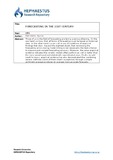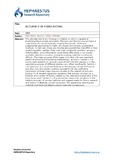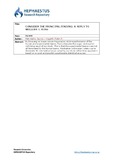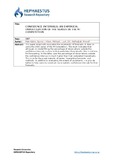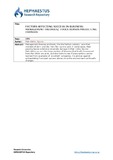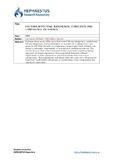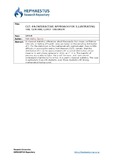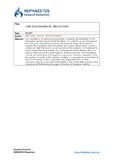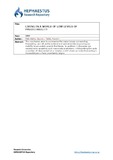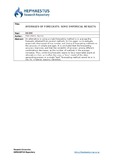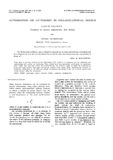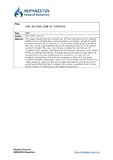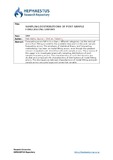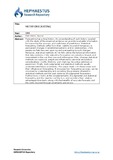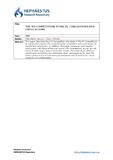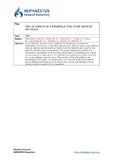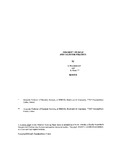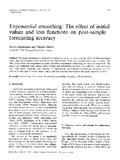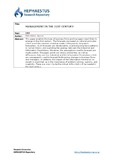Articles: Recent submissions
Now showing items 361-380 of 423
-
Forecasting in the 21st century
(International Journal of Forecasting, 1991)Those of us in the field of forecasting are facing a serious dilemma. On the one hand we know that all forms of forecasting must be based on historical data, on the other hand we are well aware of a plethora of empirical ...
-
Accuracy of Forecasting
(Blackwell, 1979)The ultimate test of any forecast is whether or not it is capable of predicting future events accurately. Planners and decision makers have a wide choice of ways to forecast, ranging from purely intuitive or judgemental ...
-
Consider the principal finding: A reply to William T. Ross
(INFORMS, Institute for Operations Research and the Management Sciences, 1988-05)By focusang on issues concerning precise reUuive perfonnance of the human and experimental teams, Ross crtsscutes the nugor, and a priori »ir[»ising result of our study. This is that the experimental teams were not all ...
-
Forecasting: Issues & Challenges for Marketing Management
(American Marketing Association, 1977-10)Forecasting plays an important role in every major functional area of business management. In the area of marketing however, forecasting is doubly important; not only does it have a central role in marketing itself, but ...
-
Confidence intervals: An empirical investigation of the series in the M-competition
(Elsevier Ltd, 1987)This paper empirically evaluates the uncertainty of forecasts. It does so using the 1001 series of the M-Competition. The study indicates that although, in model fitting the percentage of observations outside the confidence ...
-
Factors Affecting Success in Business: Management Theories/ Tools Versus Predicting Changes
(Pergamon, 1996)Management theories and tools, like the fashion industry have their moment of glory and die. Very few survive and, in some cases, their passing leaves extensive corporate damage in their wake. Spyros Makridakis reviews the ...
-
Factors affecting judgmental forecasts and confidence intervals
(Elsevier, 1989)Eighteen time series differing in their trend (three categories), randomness (three categories), and presentation on a graph (two categories) were given to 350 MBA students in a laboratory experiment. Each student was asked ...
-
CLT: An Interactive Approach for Illustrating the Central Limit Theorem
(Taylor & Francis, Ltd., 1979-05)In classical statistics, inferences about the popula- tion mean, confidence intervals, or testing of hypoth- eses are based on the sampling distribution of X. For the statistician or the mathematically sophisticated, there ...
-
Can recessions be predicted?
(Elsevier Ltd, 1977-04)Can recessions, or serious turning points in general, be predicted? Or do forecasters tend to assume that the future will continue as an extension of the near past. Theoretical evidence and practical observations tend to ...
-
Living in a world of low levels of predictability
(Elsevier, 2009)This conclusion aims to summarize the major issues surrounding forecasting, as well as the extensive empirical evidence proving our inability to accurately predict the future. In addition, it discusses our resistance to ...
-
Averages of Forecasts: Some Empirical Results
(Informs, 1983-09)An altemative to using a single forecasting method is to average the forecasts obtained from several methods. In this paper we investigate empirically the impact of the number and choice of forecasting methods on the ...
-
Automation or autonomy in organizational design.
(Gordon and Breach Science Publishers, 1979-04-23)Today there is growing criticism of the Input/Output (I/O) model as a conceptual tool for explaining and understanding how systems are functioning. These models have been particularly useful-mainly in engineering, where ...
-
The second law of systems
(Taylor & Francis, Ltd., 1977)This paper asserts that the Second Law of Thermodynamics (SLT) despite holding true in all laboratory tests heretofore conducted, cannot, by itself, explain the hierarchical universe. By examination of the existing evidence, ...
-
Sampling Distributions of Post-Sample Forecasting Errors
(Wiley, 1989)Forecasting errors fall in two clearly different categories: (a) the residual errors from fitting a model to the available data and (b) the post-sample forecasting errors. The emphasis of statistical theory and forecasting ...
-
Metaforecasting: Ways of improving forecasting accuracy and usefulness
(Elsevier, 1988)Forecasting has a long history. An understanding of such history coupled with the study of the empirical evidence can provide invaluable information for improving the accuracy and usefulness of predictions. Statistical ...
-
The M3-Competition: results, conclusions and implications
(Elsevier, 2000)This paper describes the M3-Competition, the latest of the M-Competitions. It explains the reasons for conducting the competition and summarizes its results and conclusions. In addition, the paper compares such results / ...
-
The Accuracy of Extrapolation (Time Series) Methods
(Wiley, 1982)ln the last few decades many methods have become available for forecasting. As always, when alternatives exist, choices need to be made so that an appropriate forecasting method can be selected and used for the ...
-
Judgment: Its Role and Value for Strategy
(INSEAD, 1998)Chess is an intellectually demanding game played by millions of people around the world. Yet unlike tennis or other competitive sports there are few changes in the rankings of chess players. There have only been twelve ...
-
Exponential smoothing: The effect of initial values and loss functions on post-sample forecasting accuracy
(Elsevier Ltd, 1991-11)This paper describes an empirical investigation aimed at measuring the effect of different initial values and loss functions (both symmetric and asymmetric) on the post-sample forecasting accuracy. The 1001 series of the ...
-
Management in the 21st Century
(Elsevier, 1989)This paper predicts the type of business firms and managers most likely to emerge in the 21st century. The forecasts are based on rational principles which avoid the common mistakes made in the past by long-term ...

